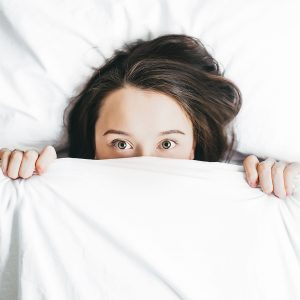How many hours do you spend alone with The Sandman each night? Gallup poles state that the average American receives about 6.8 hours of sleep each night, while over 40% of us clock in with less than six hours. That means we are sleep deprived!
Back in the early part of the century, the average amount of “out” time under the covers was over nine hours. Doesn’t that sound heavenly? But with the modernization of “life,” came many, many other distractions to take us away from our precious beauty rest: TV, video games, computers, internet (email, Facebook, Instagram, Twitter, Pinterest, etc.) And, to be frank, our culture seems to glorify “busyness.” It’s a right of passage and leads to a bit of boasting to say, “I’m SO busy! I just don’t have time.”
But, we really do have time. We just need to MAKE the time. It’s there – the days haven’t gotten any shorter and the cycles around the sun are all the same. We need to make the decision to sleep, right?
Here’s why.
Over time, sleep loss alters the normal functioning of the brain and body and disrupts the body’s ability to focus and translate sensory information.
The Symptoms:
- Yawning and Fatigue
- Moodiness and Irritability
- Depression and Anxiety
- Forgetfulness
- Lack of Focus and Motivation
- Loss of Balance and Clumsiness
- Increased Cravings for Simple Carbohydrates and Sugar
- Reduced Sex Drive
- Reduced Brain Function
Who hasn’t experienced at least one (or three or four) of these symptoms after a few long nights?
What’s more, the effects of sleep deprivation over the course of just two to three nights are alarmingly detrimental.

The Effects:
- Decreased Immunity and Increased Likelihood for Chronic Illness
- Increased Receptivity to Respiratory Disease
- Increased Risk of Cardiovascular Disease
- Increased Risk of Type II Diabetes and Increased Body Weight
- Abnormal Hormonal Production
Yikes! Remember when we were children and taking a nap seemed like a punishment? Apologize to your school teachers and parents now! – A nap is a gift these days…something we “dream” about!
May is Better Sleep Monthacross the nation and the National Sleep Foundation recommends the following amount of “zzzz”s for each age group:
- Newborns (14 to 17 hours) each day
- Infants (12 to 15 hours) each day
- Toddlers (11 to 14 hours) each day
- Preschoolers (10 to 13 hours) each day
- Children (9 to 11 hours) each day
- Teens (8 to 10 hours) each day
- Adults (7 to 9 hours) each day
- Seniors (7 to 8 hours) each day
So, how do we get there?
Well, make sleep a priority, of course, and put down the phone!!!! Sleep is far more important than the next IG post! It’s also helpful to create a bedtime routine, which includes winding down and eliminating blue light and screen time at least an hour before bed, a regular bedtime, and avoiding alcohol, caffeine, or excessive exercise several hours before hitting the sack.
Thus, may your eyes be heavy and your visit with the Man in the Moon ample and ambitious.

